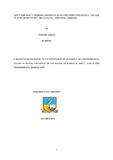Please use this identifier to cite or link to this item:
https://cris.library.msu.ac.zw//handle/11408/2173Full metadata record
| DC Field | Value | Language |
|---|---|---|
| dc.contributor.author | Chireshe, Amato | - |
| dc.date.accessioned | 2017-06-23T08:24:36Z | - |
| dc.date.available | 2017-06-23T08:24:36Z | - |
| dc.date.issued | 2015 | - |
| dc.identifier.uri | http://hdl.handle.net/11408/2173 | - |
| dc.description.abstract | This study focused on safety and health problems of food from food outlets at Nyika growth point. The purpose of the study was to evaluate safety and health hazards associated with food from food outlets. Records of the Bikita Rural District Council indicated that from 2006 to 2014, the number of food outlets increased by more than 100%. Cases of food borne illnesses increased by at least 100% according to the records of the Bikita District Hospital. A cross-sectional survey was used. A sample of 69 people was used of which 26 were food outlet owners, 40 were food outlet consumers and 3 were key informants. Graph Pad Prism 4 was used to analyse quantitative data. One way ANOVA was used to test hypothesis and 5% significance level was used. Diarrhoeal diseases were the main health implications. Figure 14 indicated that 15% of restaurant owners and 16% of grocery and butchery owners noted typhoid. On Figure 14, 18% of restaurant owners and 17% of grocery and butchery owners highlighted diarrhoea. Cuts and burns were the main safety issues. Table 5 highlighted that 52% of restaurant owners indicated burns while 48% of them indicated cuts. On Table 5, 100% of grocery and butchery owners highlighted cuts. Handling of food by ill employees, lack of financial resources and lack of food safety training were the main causes of food contamination at Nyika. Land and water pollution were the main environmental impacts. Figure 19 highlighted that 34% of restaurant owners and 33% of grocery and butchery owners indicated land pollution. On Figure 19, 32% of restaurant owners and 28% of grocery and butchery owners highlighted water pollution. Each food outlet should have a cleaning schedule and running water at appropriate temperature. All food handlers should undergo food safety training. | en_US |
| dc.language.iso | en | en_US |
| dc.publisher | Midlands State University | en_US |
| dc.subject | Safety, health | en_US |
| dc.title | Safety and health problems associated with food from food outlets: the case of Nyika growth point. Bikita district, Masvingo, Zimbabwe. | en_US |
| item.grantfulltext | open | - |
| item.languageiso639-1 | en | - |
| item.fulltext | With Fulltext | - |
| Appears in Collections: | Master Of Science In Safety Health And Environmental Management Degree | |
Files in This Item:
| File | Description | Size | Format | |
|---|---|---|---|---|
| R146094Z.pdf | Full Text | 2.74 MB | Adobe PDF |  View/Open |
Page view(s)
352
checked on Jan 23, 2026
Download(s)
224
checked on Jan 23, 2026
Google ScholarTM
Check
Items in MSUIR are protected by copyright, with all rights reserved, unless otherwise indicated.



